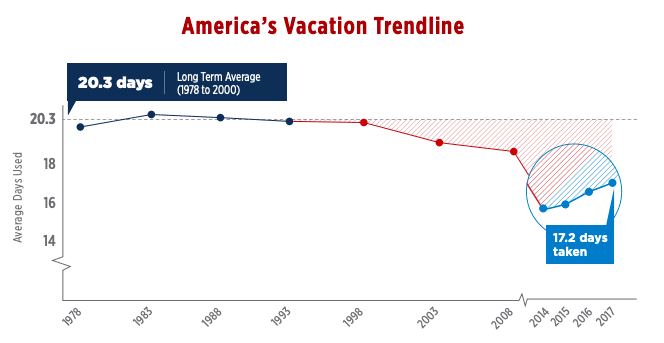Why Employee Vacation Time is Good for Business
Employees list vacation time as second only to health care as a desirable employee benefit. And the research on the benefits of paid time off couldn’t be clearer. Employee vacation time is associated with better mood, higher life satisfaction, and better health. It has been estimated that workplace-related stress is responsible for $190 billion dollars in healthcare spending and contributes to 120,000 deaths a year.
Looking at the evidence, a concerning statistic emerged. 52% of the workers who get paid vacation time don’t use it all.
Understanding why employees don’t use allocated vacation time
This stat might seem perplexing, as 23% of Americans don’t even get vacation time, but you don’t have to dig very deep to understand why. According to the U.S. Travel Association’s 2018 survey of over 4,000 workers, the number one reason employees give for not using vacation time is fear. In the competitive, demanding American workplace, they fear taking advantage of their vacation time will make them look replaceable.
A chart from the USTA report is striking. In 2008, the U.S. economy plunged into the most serious recession since the 1930s Great Depression. As a result, vacation usage plummeted by nearly a third. Only recently, as other economic indicators such as wage growth have indicated a stronger job market, has it begun to rebound.

(Source: State of American Vacation 2018, U.S. Travel Association)
Fear is a powerful emotion and an important one. Fear alerts us to dangers in our environment so that we can avoid them. But when we’re uncertain how to avoid danger, fear turns to health-impairing, performance-sapping stress. So employees who would most benefit from a vacation might be the least likely to use it.
How employers can help with employee vacation time
If employers want to reap the benefits of healthy, rejuvenated employees, they need to make sure their employees trust that they won’t be penalized for using their vacation time. In the workplace, leadership sets the tone. If all they hear from higher-ups is “deadlines”, “performance”, “extra effort” and “sacrifice”, they will have trouble trusting that their well-being is also a priority.
Trust isn’t always easy. It takes time to build and is very difficult to restore after it is violated. But the parties involved build it piece by piece, using little signs that encourage or discourage further trust. Ask yourself: when an employee calls in sick, do you complain to them about the effect that’s going to have on your work day? Or even sigh loudly as you think those thoughts? Little things can speak volumes when employees are still figuring out if they can trust their supervisors.
One of the most powerful ways to build trust is to show trust. Some companies have experimented with offering employees unlimited time off. Far from abusing it, one company reports employees actually used less vacation time when they had the opportunity to take more. Some companies have abandoned this experiment for that reason.
To some employees, especially in the famously hard-driving tech sector, it may sound like a trap. But in a company where employees feel trust, this amount of employee vacation time might be just what the doctor ordered.